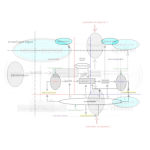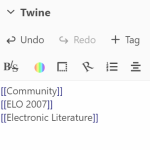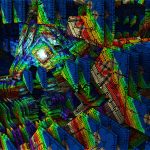The Praxis of the Procedural Model in Digital Literature, Part 1: Structural Aspects of the Model
Philippe Bootz
Phillipe Bootz defines and situates a set of artifacts, devices, material components and human groups that are in contact with earlier procedural "dispositifs." The procedural model, in Bootz's 30 year long research, analyses, theoretical frameworks and observations, expressly distinguishes human beings from material components. In opposition to artificial/human proposals such as the trans-human or the cyborg. The dispositif, in Bootz's presentation, only concerns the physical world. It does not contain signs, is not concerned with literature or art. And neither are individuals, within the procedural model, considered for themselves. They are actors at a given moment. Their positions are characterized by their power to directly act on the artifacts and objects of the dispositif.
A Review of Tactical Publishing
John-Wilhelm Flattun
Research-librarian John-Wilhelm Flattun reviews Tactical Publishing: Using Senses, Software, and Archives in the Twenty-First Century by Alessandro Ludovico. In the digital era of reading and writing — where new forms are constantly emerging old traditions wither away — how can we navigate the ever-changing landscape of publishing?
A Personal Twine Story
Chris Klimas
In a keynote delivered at ELO 2024, Chris Klimas recounts ELO 2007 and the creation of Twine. In doing so, he highlights the importance of community and open-source software in fostering digital creativity, while pondering the possibility of a platform dark forest.
Off Center Episode 12: Existential Transformative Game Design with Doris Rusch
Doris Rusch
In Off Center Episode 12, Scott Rettberg talks to game designer, academic, and author Doris Rusch about making games with meaning, existentialist psychotherapy, the resurgence of text-based games online, and embodiment: "Let’s talk about Zombie Yoga."
Reading ELIZA: Critical Code Studies in Action
David M. Berry, Mark C. Marino
Marino and Berry discuss their engagement in weekly conversations about the nature of "code, of ELIZA, its descendants" and how each of these programs have circulated within our critical code culture, along with other "contemporary conversation agents like Siri and ALEXA and, of course, ChatGPT."
Who Sees with Machines? A Review of Jill Walker Rettberg’s (Perhaps Not So) Posthuman Book on Machine Vision
Lea Laura N. Michelsen
Lea Laura N. Michelsen reviews Machine Vision: How Algorithms are Changing the Way We See the World by Jill Walker Rettberg. Machine vision is all around us, for good and bad, but who has the power to influence how we use it?
Remembering Robert Coover
Scott Rettberg, Robert Arellano, Larry McCaffery, Lance Olsen, Nick Montfort, Stéphane Vanderhaege, Caitlin Fisher, Thomas A. Bass, Tom LeClair, Alvin Lu
Scott Rettberg and Robert Arellano's collection of interviews "with critics, creative writers, students, and friends of Coover" to commemorate the passing of one of the pioneers in electronic literature.
Robert Coover
John Cayley
John Cayley commemorates Robert Coover, a prolific writer and one of the first supporters of digital writing and writing with computation who in the 1990s began teaching courses in hypermedia (with George Landow) at Brown University. This obituary was originally composed for communities associated with Brown University, Providence, Rhode Island, within which Coover lived and worked for almost a half century, and where John Cayley is Professor of Literary Arts.
Off Center Episode 25: AI Cinema with Will Luers
Scott Rettberg, Will Luers
Off center, wayward, slightly off path.... Rettberg and Luers discuss their longrunning encounters with writers, artists, computational film makers and other multidisciplinary "people who come to the electronic literature community, and it’s not only writers, but also artists, visual artists, and you find everyone has a similar kind of wayward path."
Off Center Episode 11: Filmmaking and Combinatory Cinema with Roderick Coover
Scott Rettberg, Roderick Coover
In conversation, Scott Rettberg engages with Roderick Coover and his multiplicitous career that started off as a forest ranger, a cinema projectionist, "a ski bum" and (further along) a winemaker in Burgundy, a couple of years of participant observation in Africa, the first all-electronic dissertation at the University of Chicago, works of combinatory cinema and other "differing narratives" that emerged in a still (inter)active literary and multi-medial career.
William Gillespie Netprov Interview
William Gillespie, Rob Wittig
Rob Wittig chats with William Gillespie about working with constraints and word plays, all the while emphasizing the netprov’s community building potential (a particularly big ellipsis needed, anyone?)
ebr: meeting point for conversations
Anna Nacher
Managing Editor Anna Nacher recollects the past — and sketches out the future of ebr.
William Gaddis’s Unpublished Screenplays, Stage-Drama Scripts, Prospectuses for Film & TV, and Poetry: An Archival Guide
Ali Chetwynd
A survey of Gaddis’s known and archived unpublished creative work in poetry and drama, from a parodic Elizabethan play and the complete script of Once at Antietam to a full western film screenplay and a year of failed pitches for TV drama. Each entry contains archival location information, historical information, description and analysis of the archived work, and discussion of any connection to the eventually published fiction.
William Gaddis’s Unpublished Stories and Novel-Prototypes: An Archival Guide
Joel Minor, Ali Chetwynd
A survey of Gaddis’s known and archived unpublished prose fiction, particularly short stories from before The Recognitions and incomplete forerunner projects for his eventually published novels. Those include the two aborted novels that evolved into The Recognitions, notes toward a projected novel about filmmaking that provided foundational material for Carpenter’s Gothic and A Frolic of His Own, and more. Each entry contains archival location information, historical information, description and analysis of the archived work, and discussion of any connection to the eventually published fiction.
Off Center Episode 10: Immersive Storytelling in Augmented Reality and Virtual Reality with Caitlin Fisher
Scott Rettberg, Caitlin Fisher
In this episode of "Off Center," Scott Rettberg, Director of the Center for Digital Narrative at the University of Bergen, interviews Caitlin Fisher, a pioneer of immersive AR and VR and Director of the Immersive Storytelling Lab at York University.